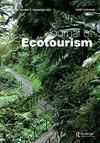Ecotourism, eudaimonia, and sustainability insights
IF 2.4
Q2 HOSPITALITY, LEISURE, SPORT & TOURISM
引用次数: 8
Abstract
ABSTRACT Since ecotourism was popularized in the late 1980s, a focus in scholarly writings on the topic has been its dual in situ mandate of biodiversity conservation and community development. As visitor education gained attention, so too did research on how nature-based aspects of ecotourist experiences influence ex situ pro-environmental. Yet, researchers have largely neglected culture-based aspects of ecotourism experiences, overlooking the role that experience with communities, people, and local culture have on visitor outcomes, thus bypassing other important sustainability-related outcomes (e.g. systems thinking, humanitarianism). The purpose of this psychological assessment of recent traveler experiences is to explore the distinct influence of the natural and cultural aspects of travel on traveler’s understanding of sustainability, and whether these influences are because of particular affective experiences during travel. This study supports the proposal that both nature and cultural-based experiences contribute to sustainability insights by fostering meaning and self-discovery (i.e. eudaimonia). Our findings suggest that the positive contribution that natural and cultural components of tourism makes toward sustainability insights may be enhanced when eudaimonic experiences are incorporated into tourism experiences. This work thus implies that more explicit incorporation of eudaimonic elements into the design of (eco-) tourism experiences will increase visitors’ sustainability insights.生态旅游、生态环境和可持续发展见解
自20世纪80年代末生态旅游开始普及以来,学术界对该主题的关注焦点一直是其生物多样性保护和社区发展的双重原位任务。随着游客教育受到关注,关于生态旅游体验中基于自然的方面如何影响非原位亲环境的研究也得到了重视。然而,研究人员在很大程度上忽视了生态旅游体验中基于文化的方面,忽视了与社区、人和当地文化的体验对游客结果的作用,从而忽略了其他重要的与可持续性相关的结果(例如系统思维、人道主义)。这项对近期旅行者经历的心理评估的目的是探索旅行的自然和文化方面对旅行者对可持续性的理解的独特影响,以及这些影响是否是由于旅行期间的特定情感经历。这项研究支持了这样一种观点,即基于自然和文化的体验都有助于通过培养意义和自我发现(即快乐)来实现可持续发展的见解。我们的研究结果表明,当现实体验被纳入旅游体验时,旅游的自然和文化成分对可持续发展见解的积极贡献可能会增强。因此,这项研究表明,在(生态)旅游体验的设计中更明确地结合现实元素将增加游客的可持续性见解。
本文章由计算机程序翻译,如有差异,请以英文原文为准。
求助全文
约1分钟内获得全文
求助全文
来源期刊

Journal of Ecotourism
Social Sciences-Geography, Planning and Development
CiteScore
6.40
自引率
12.50%
发文量
32
期刊介绍:
The Journal of Ecotourism seeks to advance the field by examining the social, economic, and ecological aspects of ecotourism at a number of scales, and including regions from around the world. Journal of Ecotourism welcomes conceptual, theoretical, and empirical research, particularly where it contributes to the dissemination of new ideas and models of ecotourism planning, development, management, and good practice. While the focus of the journal rests on a type of tourism based principally on natural history - along with other associated features of the man-land nexus - it will consider papers which investigate ecotourism as part of a broader nature based tourism, as well as those works which compare or contrast ecotourism/ists with other forms of tourism/ists.
 求助内容:
求助内容: 应助结果提醒方式:
应助结果提醒方式:


